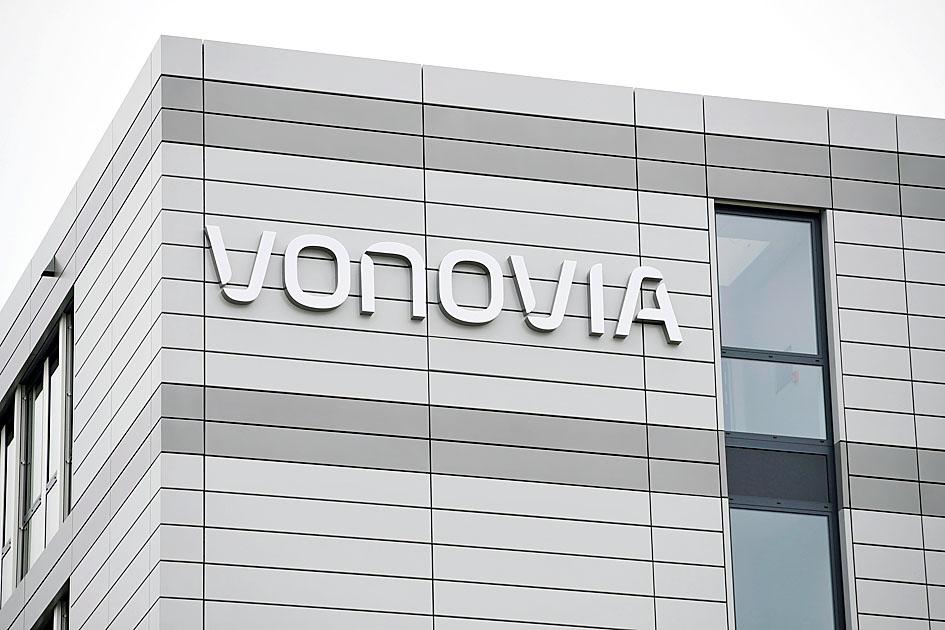German residential property firm Vonovia SE has agreed to acquire rival Deutsche Wohnen SE for about 19 billion euros (US$23 billion) in the biggest-ever takeover in European real estate, a deal that risks further stoking tensions over affordable housing.
The takeover, the year’s biggest in Europe, would reshape Germany’s property industry. The country’s two largest residential landlords control more than 500,000 apartments and risk raising further concerns about the market power of big property owners.
German landlords have faced intense public pressure over the past few years over rising prices, particularly in Berlin. Activists in the nation’s capital have targeted Deutsche Wohnen in particular with a referendum that is seeking to force the city to buy out large apartment owners.

Photo: Reuters
Amid concerns over housing and tensions over the companies’ large holdings in Berlin, the deal is an effort at a “new beginning,” Vonovia chief executive officer Rolf Buch said on a conference call yesterday.
He said that he would speak with Berlin Mayor Michael Mueller later in the day to discuss the deal.
The combined company plans to offer to sell about 20,000 apartments to the city, a presentation showed.
Under the deal, Vonovia would offer 53.03 euros per share in cash for each Deutsche Wohnen share, including a proposed dividend, the companies said in a statement late on Monday.
The bid represents about an 18 percent premium to Deutsche Wohnen’s closing price on Friday last week.
The stock jumped as much as 16 percent to 52.38 euros yesterday. Vonovia’s shares fell as much as 6.8 percent to 48.57 euros.
Vonovia is planning a rights issue of as much as 8 billion euros after the completion of the transaction, expected in the second half of the year. The companies anticipate 105 million euros in cost savings a year from the joint management of their portfolios.
Deutsche Wohnen chief executive officer Michael Zahn and chief financial officer Philip Grosse are expected to be named to Vonovia’s management board after the acquisition, the companies said.
A takeover of Deutsche Wohnen would mark the crowning achievement for serial dealmaker Buch. He built Bochum-based Vonovia into a European property heavyweight through several acquisitions, including the 2019 purchase of Swedish landlord Hembla AB and a 2016 deal for Austrian developer Conwert Immobilien Invest SE.

Intel Corp chief executive officer Lip-Bu Tan (陳立武) is expected to meet with Taiwanese suppliers next month in conjunction with the opening of the Computex Taipei trade show, supply chain sources said on Monday. The visit, the first for Tan to Taiwan since assuming his new post last month, would be aimed at enhancing Intel’s ties with suppliers in Taiwan as he attempts to help turn around the struggling US chipmaker, the sources said. Tan is to hold a banquet to celebrate Intel’s 40-year presence in Taiwan before Computex opens on May 20 and invite dozens of Taiwanese suppliers to exchange views

Application-specific integrated circuit designer Faraday Technology Corp (智原) yesterday said that although revenue this quarter would decline 30 percent from last quarter, it retained its full-year forecast of revenue growth of 100 percent. The company attributed the quarterly drop to a slowdown in customers’ production of chips using Faraday’s advanced packaging technology. The company is still confident about its revenue growth this year, given its strong “design-win” — or the projects it won to help customers design their chips, Faraday president Steve Wang (王國雍) told an online earnings conference. “The design-win this year is better than we expected. We believe we will win

Chizuko Kimura has become the first female sushi chef in the world to win a Michelin star, fulfilling a promise she made to her dying husband to continue his legacy. The 54-year-old Japanese chef regained the Michelin star her late husband, Shunei Kimura, won three years ago for their Sushi Shunei restaurant in Paris. For Shunei Kimura, the star was a dream come true. However, the joy was short-lived. He died from cancer just three months later in June 2022. He was 65. The following year, the restaurant in the heart of Montmartre lost its star rating. Chizuko Kimura insisted that the new star is still down

While China’s leaders use their economic and political might to fight US President Donald Trump’s trade war “to the end,” its army of social media soldiers are embarking on a more humorous campaign online. Trump’s tariff blitz has seen Washington and Beijing impose eye-watering duties on imports from the other, fanning a standoff between the economic superpowers that has sparked global recession fears and sent markets into a tailspin. Trump says his policy is a response to years of being “ripped off” by other countries and aims to bring manufacturing to the US, forcing companies to employ US workers. However, China’s online warriors